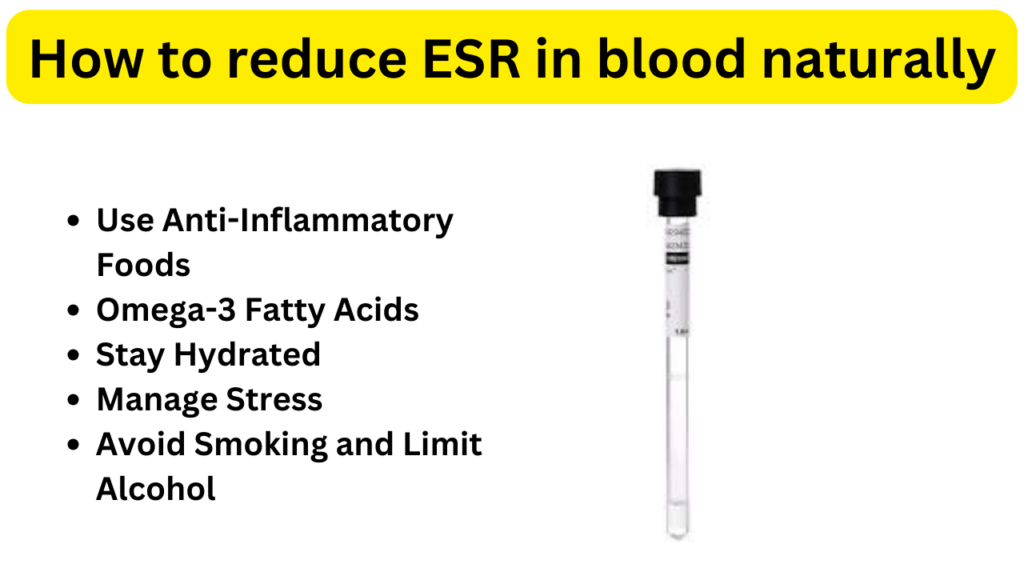Here you will learn about How to reduce ESR in blood naturally.

Erythrocyte Sedimentation Rate (ESR) is a commonly used blood test that measures the rate at which red blood cells settle at the bottom of a tube over a certain period.
ESR is a non-specific marker of inflammation in the body and can be elevated for various reasons, such as infections, autoimmune disorders, and chronic diseases. While elevated ESR is not a diagnosis in itself, it can signal underlying health issues.
You can lower esr in blood by following natural ways.
- Maintain a Healthy Diet
One of the most effective ways to lower ESR naturally is by adopting a healthy diet. Focus on incorporating the following dietary habits:
a. Anti-Inflammatory Foods: Consume foods rich in antioxidants and anti-inflammatory properties, such as fruits, vegetables, nuts, and fatty fish. These foods can help reduce overall inflammation in the body.
b. Omega-3 Fatty Acids: Include sources of omega-3 fatty acids like flaxseeds, walnuts, chia seeds, and fatty fish (salmon, mackerel) in your diet. Omega-3s have been shown to reduce inflammation and lower ESR.
c. Turmeric and Ginger: These spices contain potent anti-inflammatory compounds. Incorporate turmeric and ginger into your cooking or consider taking supplements.
d. Whole Grains: Opt for whole grains like brown rice, quinoa, and oats instead of refined grains. Whole grains have a lower glycemic index and can help stabilize blood sugar levels, which in turn may reduce inflammation.
- Stay Hydrated
Adequate hydration is essential for overall health and can help reduce ESR levels. Water helps flush toxins from the body and supports proper circulation. Aim to drink at least eight glasses of water per day and adjust your intake based on your activity level and climate.
- Exercise Regularly
Physical activity plays a crucial role in maintaining a healthy body and reducing inflammation. Regular exercise helps improve blood circulation, reduce body fat, and promote overall well-being. Engage in a mix of aerobic exercises, strength training, and flexibility exercises to reap the full benefits of a well-rounded fitness routine.
- Manage Stress
Chronic stress can contribute to inflammation in the body, which may lead to elevated ESR levels. Practice stress-reduction techniques such as meditation, deep breathing exercises, yoga, or mindfulness to help manage stress effectively.
- Get Adequate Sleep
Quality sleep is essential for the body to repair and regenerate. Aim for 7-9 hours of restful sleep each night. Poor sleep patterns can lead to increased inflammation and may contribute to higher ESR levels.
- Avoid Smoking and Limit Alcohol
Smoking is a well-known contributor to inflammation, so quitting smoking can have a positive impact on ESR levels. Additionally, limit alcohol consumption, as excessive alcohol intake can also increase inflammation.
- Maintain a Healthy Weight
Excess body weight can promote inflammation in the body. If you are overweight, working towards a healthy weight through a balanced diet and regular exercise can help reduce inflammation and ESR levels.